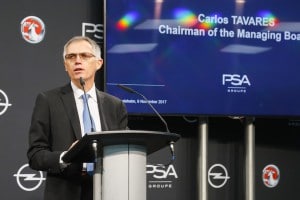
It appears FCA and PSA are on the cusp of an MoU. The resulting merger is expected to keep John Elkann in the role of chairman of the new company.
Fiat Chrysler Automobiles and PSA Group are expected to take the critical next step in their march towards a merger Wednesday by issuing a binding memorandum of understanding.
The boards of the two companies were meeting separately on Tuesday to discuss their plans which, if formalized would result in a deal valued at around $50 billion, creating what would become the world’s fourth-largest automaker.
The latest development should reassure those who worried that a multibillion dollar lawsuit filed last month by General Motors against FCA could wind up scuttling the proposed merger with the French parent of the Peugeot and Citroen brands.
(General Motors sues Fiat Chrysler, claims bribery of UAW cost it billions)

PSA CEO Carlos Tavares is credited with pulling together a major turnaround since taking over the French automaker.
In late November, the two automakers announced plans to create an automotive powerhouse. It marked the culmination of a decade-long search by Fiat Chrysler to find a merger partner that would give it the necessary economies of scale in today’s highly competitive global automotive industry. The Italian-American manufacturer had a false start earlier in the year when a proposed partnership with France’s largest automaker, Renault, collapsed.
One of the reasons that deal fell through was the intervention of the French government, which holds a controlling stake in Renault. Officials were concerned about the impact such a merger would have on the strained relationship between Renault and its Japanese alliance partner Nissan.
France owns 12% of PSA, as well, but government officials have been more upbeat since the initial deal with FCA was announced.
Such a merger, the French finance ministry said in a Monday statement, “makes sense in order to build a new champion with global scale to take on the challenges of sustainable mobility.”
Based on current numbers, a combined FCA/PSA would have annual sales of around 8.7 million vehicles. That would put them in fourth place in terms of the global automotive pecking order, behind Volkswagen AG, Toyota and the Renault-Nissan-Mitsubishi Alliance, but ahead of once-dominant General Motors.

Tavares has earned a reputation as one of the industry’s best leaders and is expected to the CEO of the merged FCA-PSA.
(FCA, PSA set to sign binding merger agreement)
There had been some speculation GM might be trying to disrupt the planned merger when it filed a racketeering case against Fiat Chrysler last month. The lawsuit alleges that former FCA CEO Sergio Marchionne oversaw a conspiracy to bribe the United Auto Workers Union to get contract concessions giving the automaker an advantage over its Detroit rival. GM has denied it was hoping to scuttle the merger with PSA.
The proposed binding memorandum of understanding would contain some minor revisions to the deal first announced six weeks ago, according to a report by the Bloomberg news service. Sources have declined to discuss what those updates might involve.
Though the original proposal called for a “merger-of-equals,” with each company getting a 50% stake in the combined automaker, PSA was expected to dominate, its CEO Carlos Tavares set to retain his role in the combined entity. FCA’s Chairman John Elkann would also hold that post after the merger.

Current FCA CEO Mike Manley is expected to remain with the merged FCA-PSA company, perhaps as chief operating officer.
Though it was not revealed what would happen with other senior managers, sources assured TheDetroitBureau.com that Fiat Chrysler’s current CEO Mike Manley was planning to remain with the new company, possibly in the role of chief operating officer.
Since signing on in 2013 as head of what was then a floundering carmaker, Tavares has turned PSA into a solid performer. Significantly, within just a year after acquiring General Motors’ loss-making Opel/Vauxhall subsidiary, his team had it generating a modest profit.
But despite his reputation for cost-cutting and efficiencies, both PSA and FCA have promised that they won’t cut any of their current plants after the merger. If anything, they are hoping that the deal will help them gain traction in markets – and market segments – where they are each currently weak.
(PSA-FCA plan to retain all brands after merger)
If the two boards follow through with the expected MoU, it will come just a day after the UAW formally ratified its latest contract with FCA covering 47,000 U.S. workers. The agreement calls for $9 billion in new investments during the next four years while securing or creating 7,900 jobs.
